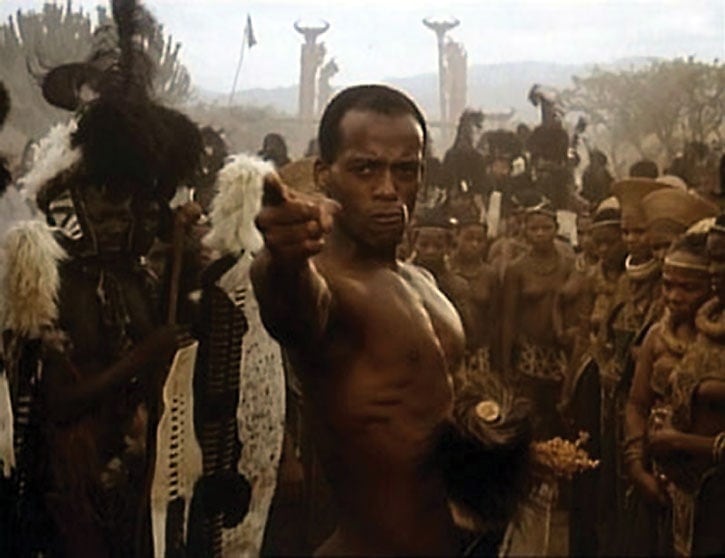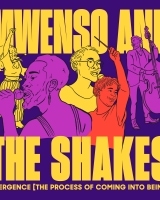Hour 1

Sitayi: “Daughter of Bhebhe, from your womb shall come first-born of a king, giving birth to a mighty nation of blood-stained spears and thundering black shields.”
— Shaka’s pregnant mother, Nandi is told her son’s future. From hour three of Shaka Zulu.
The second night of Shaka Zulu centers on the story of the king’s mother, Nandi, and how she conceived and raised Shaka to be heir to the Zulu throne. The woman cast to play this crucial role was model Dudu Mchize, who showcased an impressive emotional range over two hours of the miniseries which focus on the way that women in young Shaka’s family shaped his adult personality and motivations. Yet, achieving a historically accurate dresscode for these women posed a potential problem for the series production team, when considering the reaction to partial nudity by TV censors in the various countries where Shaka Zulu would air — something that The New York Times touched on within a review of the miniseries, ahead of its airing on New York’s WNYW Fox affiliate station:
Alec Mills, the director of photography, makes the most of Zululand’s breathtaking vistas, while a predominantly Zulu cast conveys a sense of life 150 years ago, its conventions and rituals, with an almost incredible feeling of authenticity. One note of interest: WNYW will announce that the series may not by suitable for all family members, evidently because the authenticity extends to great waves of bare breasts and buttocks.
Mchize addressed that wardrobe-related partial nudity during a U.S. interview to promote the miniseries:
Then, that’s how everybody used to dress. So really, to me, it was nothing different. Okay, fine, I mean here and there I thought “Ugh,” because I’ve been brought up in a city, and here I am, I have to walk around [topless]. But it was no big deal, because I mean there were thousands and thousands of people, and everybody looks very normal.
Sitting beside Mchize for the interview was series director, William C. Faure, who expounded on the importance of historic accuracy:
It would have been absurd, totally absurd, to have a young Zulu maiden for instance fully clad. It would have gone totally against the traditions of dress, and would not have been accepted by the historians. So it was crazy for us to even… and we had this out, because we knew that there were going to be problems with the nudity. And we discussed it at length, and said, “You have to accept, because we will really become the laughing stock of the historians.”
However, much of Shaka’s early history that we see during night two is not based on contemporary ink-and-paper recorded accounts, but rather 200 year-old passed-down stories of his descendants. During her interview, though, Mchize deemed this folklore approach a positive, given the distorted accounts of Shaka long found in apartheid-era South African textbooks:
I don’t want to talk about what I read at school, but what I’ve been told by my parents. You know, at home, my mom and dad, all they were telling us about was Shaka, Nandi, all those people who were involved in the royal family. How great they are. How important they were. And when I got involved in the miniseries, I took the part with pride. And when I looked at the script, I had to look at it, and think of what my parents told me, what they used to tell me about the whole thing. And when I saw it’s right, it matches, you know, I didn’t even think of the books at school. And to me, he was portrayed as the greatest man that ever lived.
Great… and terrible. A key to Shaka Zulu’s well-aged quality is that it is not a dismissible propaganda piece built to praise a famous man. Rather, its creators strive for a dynamic portrayal, including distasteful details and deep character flaws. Thus, even as Faure and series writer Joshua Sinclair highlight their subject’s sharp intelligence and masterful mental victories over the newly-arrived European “Swallows”, they do not not shy away from depicting Shaka’s brutal psychological and physical methods of maintaining control over his kindom’s subjects.
The night’s first hour begins with seven minutes of Dr. Henry Fynn’s voiceover, read from the field journal we glimpse him updating throughout the miniseries. Here, it serves to bridge “the horrendous ordeal of the gift ceremony” from his diplomatic team’s arrival, to January 1824 and an overview of their daily routine at Shaka’s kraal at Kwa Bulawayo (translated as “the place of the killing”) — describing it as “not at all an unpleasant experience… if one could turn a blind eye to the often terrifying events surrounding life at the royal court.”
Though the team is treated well, Fynn notes how previous false reports about Shaka’s character have put the Europeans at a tactical disadvantage in negotiations. The king is suspicious of their motives, and keeps his guests uncertain about their ultimate fate with both subtle and explicit forms of intimidation — which he also uses to quash internal dissent:
Every morning, the people were summoned in their thousands to attend court proceedings. Carefully guarded by his uFasimba regiment, his feared personal bodyguard, he underwent a ritual morning anointing, his body being greased down with a mixture of red ochre and sheep’s tail fat. While outside in the royal area, in front of the king’s huge hut, the people were assembled. He then appeared, proceeded by half a dozen or so praise singers, all recounting the heroic deeds of the king from boyhood to the present. The people, in one voice, would echo the praise singers, shouting and crashing their shields. This terrifying, and indeed awe-inspiring, spectacle being sustained entirely at the king’s pleasure. Should anyone tire before the king’s signal to cease, they would be slaughtered at a whim by the uFasimba regiment. We noticed that the people remained untiring in their admiration.
Fynn’s journal also gives important insight about those rare Zulus that Shaka trusts… and one in particular that he does not:
The most important member of the council was Ngomane, his prime minister, whom he frequently did consult and appeared to respect. It was, however, the military side, which as we’d already seen during the trek to the capital, was the most impressive. Regiment upon regiment of highly disciplined warriors trained in the apparently unique Shaka battle method. His generals, drawn from those early days when he was training his men himself, were his most trusted friends, and were the only people in his domain to whom he really gave a full ear. And indeed, they were the ones trusted with the expansion of the empire’s borders. In these ranks, Shaka could not afford any form of treachery… which brings me to Dingane, the king’s half-brother.
Fynn observes that Dingane’s treacherous nature is an open secret at Kwa Bulawayo. Ironically, this is key to his survival, since Shaka uses his half-brother as bait to lure out traitors. Regardless, Dingane secretly meets with Shaka’s most dangerous external enemy, Zwide, and plots an assassination attempt, with the Swallows to serve as scapegoats. Unaware of the imminent danger he is in, Fynn spends his time at The Place of the Killing researching the power structure around Shaka, and the surprising female aspect of it:
Three women began to emerge as an important forces at Kwa Bulawayo. Nearly always present at important ceremonies was Nandi, the king’s mother; Mkabi, the king’s aunt; and Sitayi, the grotesquely old and frail chief witch doctor of the realm. I suppose the best way to describe her was that she constituted the spiritual arm of his court — a bit like the Archbishop of Canterbury, I suppose. Although, I’m not sure he would appreciate the comparison. She wielded enormous power, and no one was able to tell us exactly how old she was. Fantastic figures of hundreds of years were bandied about, while her supernatural powers were exalted by all I spoke to. But it was Nandi who was to emerge as the most powerful force in a story which, as I began to piece it together, became increasingly difficult to believe. Tales of supernatural forces, great prophecies, and magical witchcraft surrounding a king’s power and the making of his spear — almost an Excalibur, as it were. But such was the conviction of the people who told me these fantastic events, that I felt obliged to at least set them down, and let my readers decide for themselves what was truth, and what was fantasy.
While that fantasy helps build Shaka’s legendary stature, it is the tragic truth of his turbulent early family life that will construct the flesh-and-blood man behind the myth — as we shall see in future hours of Shaka Zulu.

